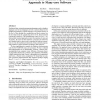48 search results - page 7 / 10 » Language Primitives and Type Discipline for Structured Commu... |
119
click to vote
IFL
1997
Springer
15 years 6 months ago
1997
Springer
Common subexpression elimination is a well-known compiler optimisation that saves time by avoiding the repetition of the same computation. In lazy functional languages, referential...
PLDI
2010
ACM
15 years 7 months ago
2010
ACM
Traditional data-oriented programming languages such as dataflow s and stream languages provide a natural abstraction for parallel programming. In these languages, a developer fo...
124
Voted
TLDI
2009
ACM
15 years 11 months ago
2009
ACM
Type-and-effect systems are a natural approach for statically reasoning about a program’s execution. They have been used to track a variety of computational effects, for example...
129
Voted
OOPSLA
2010
Springer
15 years 1 months ago
2010
Springer
Tribal Ownership unifies class nesting and object ownership. Tribal Ownership is based on Tribe, a language with nested classes and object families. In Tribal Ownership, a progra...
115
click to vote
ICFP
2006
ACM
16 years 2 months ago
2006
ACM
Despite its powerful module system, ML has not yet evolved for the modern world of dynamic and open modular programming, to which more primitive languages have adapted better so f...

